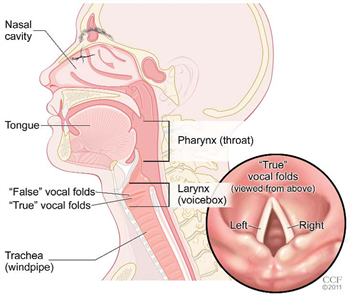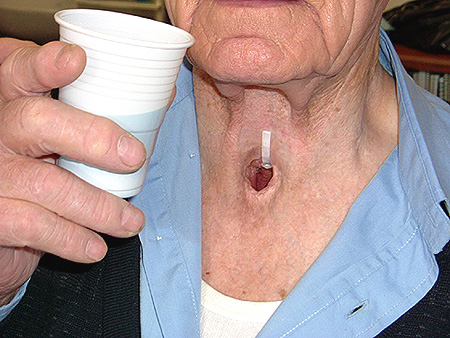#Lifestory: a Motivation From Laryngeal Cancer Survivor
Sometimes I feel like I'm being flicked by the patients I've been working with. Smooth but touching enough in my heart. Not directly, indeed. But their attitude and behavior made me really embarrassed. Shame for what I'm doing right now. Shame on myself that I always try to encourage others but forget about myself.
Either a coincidence or it’s a God's plan for me to never stop learning. Almost every part I go through, I always get a patient whose life quota is predicted shortly. But they seem to never be burdened with a chance to live a matter of time. An optimistic sense of a thousand years' life, that's what I read from their faces.
Cancer. I've been dealing with patients whose bodies have been ravaged by malignant tumors. Similarly, while I was in ENT department, I got a patient who was diagnosed with laryngeal cancer.

Laryngeal Cancer (source: fromdoctor.com)
I have already imagine about my patient's condition. The cancer cell must have blocked the airway and his vocal cords. His neck attached by endotracheal tube and his sound that barely exist anymore. It's so sad, I thought.
However, the reality is not as expected. In the early morning of the first follow-up, my patient-an old man, has been sitting neatly with his wife. A smile from his lips as he saw me coming over. He held out his hand to greet me.
"Mister, I'm Liza, the resident doctor who handles you," I explained, followed by a nod of his head. He losed his voice because the vocal cords also attacked by cancer. But he looked still happy and spiritfully.
His eyebrows showed a passionate passion. Although no voice, he still tried to communicate with me with his gestures or writing. When I explained the progress of his illness, he always nodded with enthusiasm. There was no jet of sadness there, only the desire to heal the smoldering.
When the ENT specialist conveys that the management of the disease by lifting the cancer cell with laringectomy (surgical removal of the larynx) and then followed by radiation therapy, he nodded firmly agree.

Laryng anatomy (source: CCF 2011)
"There are some risks after surgery, you will still breathe through a hole in your neck and you can not talk like you used to. If not operated, the cancer will spread to other organs and will be very dangerous. However, every action must have a risk. Especially this is a big operation. "I explained to him. I saw his wife's face afraid to imagine the process that her husband would live. But not with the old man.
My patient was still smiling. Then he said with sign language that it does not matter if he can not talk as long as he can eat and worship like a normal person.
So, I was completely touched by the reason that he expressed by the sign language.
Based on doctor's instructions, I prepared all of the requirements for surgery including intensive care unit (ICU) for postoperative care. Because the surgery to be performed is a major surgery involving the respiratory tract, strict monitoring should be performed both when and after surgery.
Laringectoly was successfully implemented. And what made me and the other consulents chuckle in amazement was that my patient's postoperative condition was not as bad as we thought. He quickly became aware of the anesthetic and only a few days he was admitted to the ICU.

Laryngeal Cancer Patient after tracheotomy (Source : familymedicinehelp.com)
"High spirits are very influential, Doctor. This patient gets better than we expected, "I told my consul.
"Plus prayer to God," the doctor said.